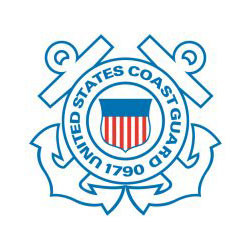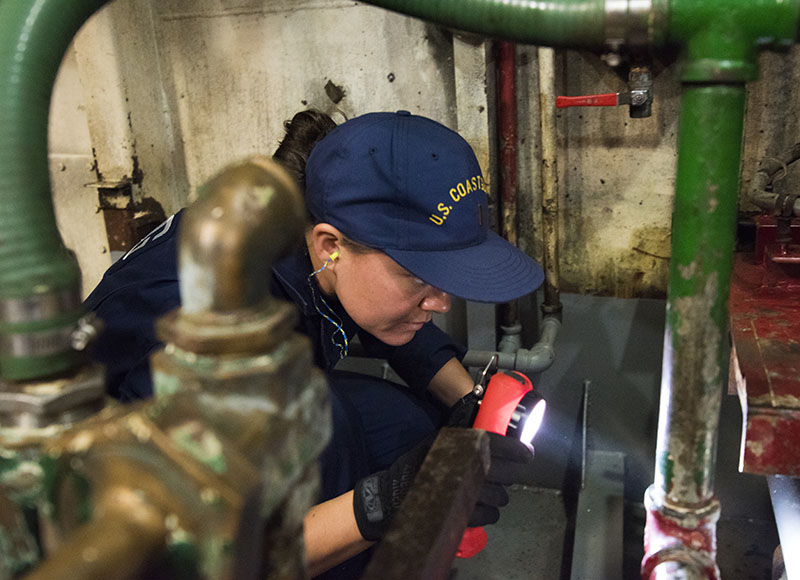The Coast Guard released a Marine Safety Information Bulletin yesterday (MSIB Number: 09-20) that discussed the agency's position on vessel inspections, exams, and documentation during the coronavirus pandemic.
During this national emergency for Covid-19 it is paramount that the Coast Guard safeguards the continued operation of the Marine Transportation System (MTS) to ensure our domestic supply chain continues uninterrupted, the MSIB said. Commercial vessel compliance activities should, to the extent possible, continue so as to safeguard the MTS and prevent an undue backlog from causing future delays, the notice said. To facilitate the safe flow of commerce, the Coast Guard said it will liberally use remote inspection techniques to verify vessel compliance and, if needed, defer inspections.
The following is the Coast Guard’s current position on commercial vessel compliance activities:
Prior to boarding a vessel or immediately prior to conducting a pre-exam/inspection meeting, Marine
Inspectors, Port State Control Officers (PSCOs), and Commercial Fishing Vessel Examiners will verify with the
vessel representative that there are no ill persons onboard. Coast Guard personnel will practice the appropriate
protective measures as outlined by the Centers for Disease Control and Prevention (CDC).
U.S.-flagged vessel and Outer Continental Shelf (OCS) inspections:
1. U.S.-flagged vessels and OCS units due for Certificate of Inspection (COI) renewals, annual inspections, periodic inspections, dry dock exams, and internal structural examinations (ISE) that are
based on statutory or regulatory requirements should be addressed on a case-by-case basis by the local
OCMI. Based on the OCMI’s evaluation of the history of the vessel and in consultation with the vessel
owner or operator, the OCMI may:
o Require Coast Guard attendance onboard the vessel to conduct a full or abbreviated inspection;
o Accept objective evidence such as recent classification surveys, pictures, video, vessel logs,
machinery alarm reports, etc., in lieu of Coast Guard attendance onboard the vessel to credit a
required inspection or exam. (A dry dock, pressure vessel, or other non-annual exam may only be
credited for a maximum of one year.);
o Defer a required inspection or exam for up to 90 days; or
o Issue a CG Form CG-835V to restrict the vessel movement as a worklist item.
2. Recognized organizations (ROs) and Third Party Organizations (TPOs) that are conducting surveys and
audits on behalf of the Coast Guard may request extensions on a case-by-case basis on behalf of the
vessel owner or operator. This includes both internal and external surveys for those companies/vessels
subject to Subchapter M requirements. Surveys and audits that require travel to or through high-risk
affected areas will generally constitute sufficient reason for the Coast Guard to grant an extension. When
evaluating if an extension will be granted, the OCMI or the Office of Commercial Vessel Compliance
(CG-CVC) will evaluate the vessel’s history of compliance and may require objective evidence to verify
if the vessel complies with the applicable laws and regulations. Any extension of a statutory or regulatory required survey or audit will be documented in writing by the RO/TPO and should generally
not be more than 90 days. ROs/TPOs that seek to use remote survey in lieu of attendance on vessels that
are both classed and certificated should contact the Flag State Control Division (CG-CVC-4) or the
Towing Vessel National Center of Expertise (TVNCOE) to propose the methods and administrative
procedures that will be used. Extension requested for vessels subject to Subchapter M requirements
should be relayed by the TPO to the OCMI.
3. The same allowances should be considered for companies that are required to complete internal vessel
and management audits as required by ISM or TSMS. These companies should work through their
RO/TPO for extension requests; however, extensions granted for this work is not required to be reported
to the Coast Guard, but rather documented by company and RO/TPO.
Port State Control (PSC) Exams:
1. The Coast Guard will continue to use a risk based program to determine which vessels will be required
to undergo a Port State Control Exam. The Coast Guard will not issue deficiencies or detain vessels for
expired certificates, documents or mariner credentials until Oct. 1, 2020.
2. Certain Certificate of Compliance (COC) exams are a statutory and regulatory requirement. Based on
the OCMI’s evaluation of the history of the vessel, the OCMI may:
o Require Coast Guard attendance onboard the vessel to conduct a full or abbreviated exam;
o Accept objective evidence such as vessel status within Qualship 21, previous port state or flag state
exams, recent classification surveys, pictures, video, vessel logs, machinery alarm reports, etc. in
lieu of Coast Guard attendance onboard the vessel to credit a required inspection or exam; or
o Defer a required inspection or exam for up to 90 days




